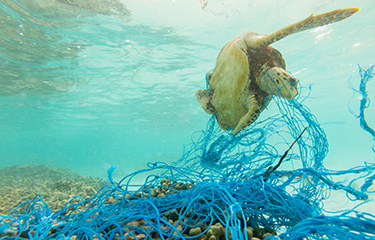Lost and discarded fishing “ghost gear” accounted for as much as 75 percent of plastic pollution found on the world’s coral reefs, according to a study, “Plastic pollution on the world’s coral reefs,” published 12 July in Nature.
Every one of the 85 coral reefs included in the global study was found polluted with plastic, including deeper reefs between 30 and 150 meters deep. Comoros was found to have the most-polluted reefs, with nearly 84,500 plastic items found per square kilometer, while the Marshall Islands had the least-polluted reefs at 580 pieces of plastic per square kilometer.
“It was surprising to find that debris increased with depth, since deeper reefs in general are farther from sources of plastic pollution,” Luiz Rocha, the co-director of the Hope for Reefs initiative at the California Academy of Sciences and one of the study’s co-authors, told The Guardian. “We are almost always the first humans to set eyes on these deeper reefs, and yet we see human-produced trash on every dive.”
The study, completed by researchers from the universities of São Paulo, Oxford, and Exeter, the California Academy of Sciences, and the non-governmental organization Nekton, found nearly three-quarters of the plastic they found was derived from lost or discarded fishing gear including ropes, lines, and nets – so-called “ghost gear.”
The researchers found more plastic pollution in reefs nearer to populated cities and near the borders of marine protected areas, which is often where commercial fishing effort is concentrated. And more plastic pollution was found at greater depths than shallower areas, likely because marine currents and turbulence push it deeper.
The plastic can spread coral disease, and fishing lines and nets can damage reefs, thereby affecting abundance and diversity, according to the study. The authors warned plastic pollution represents an “emerging threat” to the world’s coral, which is already threatened by rapidly changing marine conditions including climate change, the researchers said. They called for more stringent international agreements curbing the flow of plastic waste ending up in the ocean and the inclusion of fishing gear in those agreements. They also asked for the deepening of marine protected areas to include deep-water coral reefs, and for the development of low-cost biodegradable alternatives to plastic items.
“Our findings reveal some of the complex collective challenges we face when dealing with plastic pollution,” University of São Paulo Professor Hudson Pinheiro, the study’s lead author, told The Guardian. “As marine resources around the world dwindle, humans that rely on those resources are turning to deeper habitats and those closer to marine protected areas where fish remain abundant.”
Photo courtesy of Mohamed Abdulraheem/Shutterstock







